#anti gun logic
Text
Apple fucked us on right to repair (again)

Today (September 22), I'm (virtually) presenting at the DIG Festival in Modena, Italy. Tonight, I'll be in person at LA's Book Soup for the launch of Justin C Key's "The World Wasn’t Ready for You." On September 27, I'll be at Chevalier's Books in Los Angeles with Brian Merchant for a joint launch for my new book The Internet Con and his new book, Blood in the Machine.

Right to repair has no cannier, more dedicated adversary than Apple, a company whose most innovative work is dreaming up new ways to sneakily sabotage electronics repair while claiming to be a caring environmental steward, a lie that covers up the mountains of e-waste that Apple dooms our descendants to wade through.
Why does Apple hate repair so much? It's not that they want to poison our water and bodies with microplastics; it's not that they want to hasten the day our coastal cities drown; it's not that they relish the human misery that accompanies every gram of conflict mineral. They aren't sadists. They're merely sociopathically greedy.
Tim Cook laid it out for his investors: when people can repair their devices, they don't buy new ones. When people don't buy new devices, Apple doesn't sell them new devices. It's that's simple:
https://www.inverse.com/article/52189-tim-cook-says-apple-faces-2-key-problems-in-surprising-shareholder-letter
So Apple does everything it can to monopolize repair. Not just because this lets the company gouge you on routine service, but because it lets them decide when your phone is beyond repair, so they can offer you a trade-in, ensuring both that you buy a new device and that the device you buy is another Apple.
There are so many tactics Apple gets to use to sabotage repair. For example, Apple engraves microscopic Apple logos on the subassemblies in its devices. This allows the company to enlist US Customs to seize and destroy refurbished parts that are harvested from dead phones by workers in the Pacific Rim:
https://repair.eu/news/apple-uses-trademark-law-to-strengthen-its-monopoly-on-repair/
Of course, the easiest way to prevent harvested components from entering the parts stream is to destroy as many old devices as possible. That's why Apple's so-called "recycling" program shreds any devices you turn over to them. When you trade in your old iPhone at an Apple Store, it is converted into immortal e-waste (no other major recycling program does this). The logic is straightforward: no parts, no repairs:
https://www.vice.com/en/article/yp73jw/apple-recycling-iphones-macbooks
Shredding parts and cooking up bogus trademark claims is just for starters, though. For Apple, the true anti-repair innovation comes from the most pernicious US tech law: Section 1201 of the Digital Millennium Copyright Act (DMCA).
DMCA 1201 is an "anti-circumvention" law. It bans the distribution of any tool that bypasses "an effective means of access control." That's all very abstract, but here's what it means: if a manufacturer sticks some Digital Rights Management (DRM) in its device, then anything you want to do that involves removing that DRM is now illegal – even if the thing itself is perfectly legal.
When Congress passed this stupid law in 1998, it had a very limited blast radius. Computers were still pretty expensive and DRM use was limited to a few narrow categories. In 1998, DMCA 1201 was mostly used to prevent you from de-regionalizing your DVD player to watch discs that had been released overseas but not in your own country.
But as we warned back then, computers were only going to get smaller and cheaper, and eventually, it would only cost manufacturers pennies to wrap their products – or even subassemblies in their products – in DRM. Congress was putting a gun on the mantelpiece in Act I, and it was bound to go off in Act III.
Welcome to Act III.
Today, it costs about a quarter to add a system-on-a-chip to even the tiniest parts. These SOCs can run DRM. Here's how that DRM works: when you put a new part in a device, the SOC and the device's main controller communicate with one another. They perform a cryptographic protocol: the part says, "Here's my serial number," and then the main controller prompts the user to enter a manufacturer-supplied secret code, and the master controller sends a signed version of this to the part, and the part and the system then recognize each other.
This process has many names, but because it was first used in the automotive sector, it's widely known as VIN-Locking (VIN stands for "vehicle identification number," the unique number given to every car by its manufacturer). VIN-locking is used by automakers to block independent mechanics from repairing your car; even if they use the manufacturer's own parts, the parts and the engine will refuse to work together until the manufacturer's rep keys in the unlock code:
https://pluralistic.net/2023/07/24/rent-to-pwn/#kitt-is-a-demon
VIN locking is everywhere. It's how John Deere stops farmers from fixing their own tractors – something farmers have done literally since tractors were invented:
https://pluralistic.net/2022/05/08/about-those-kill-switched-ukrainian-tractors/
It's in ventilators. Like mobile phones, ventilators are a grotesquely monopolized sector, controlled by a single company Medtronic, whose biggest claim to fame is effecting the world's largest tax inversion in order to manufacture the appearance that it is an Irish company and therefore largely untaxable. Medtronic used the resulting windfall to gobble up most of its competitors.
During lockdown, as hospitals scrambled to keep their desperately needed supply of ventilators running, Medtronic's VIN-locking became a lethal impediment. Med-techs who used donor parts from one ventilator to keep another running – say, transplanting a screen – couldn't get the device to recognize the part because all the world's civilian aircraft were grounded, meaning Medtronic's technicians couldn't swan into their hospitals to type in the unlock code and charge them hundreds of dollars.
The saving grace was an anonymous, former Medtronic repair tech, who built pirate boxes to generate unlock codes, using any housing they could lay hands on to use as a case: guitar pedals, clock radios, etc. This tech shipped these gadgets around the world, observing strict anonymity, because Article 6 of the EUCD also bans circumvention:
https://pluralistic.net/2020/07/10/flintstone-delano-roosevelt/#medtronic-again
Of course, Apple is a huge fan of VIN-locking. In phones, VIN-locking is usually called "serializing" or "parts-pairing," but it's the same thing: a tiny subassembly gets its own microcontroller whose sole purpose is to prevent independent repair technicians from fixing your gadget. Parts-pairing lets Apple block repairs even when the technician uses new, Apple parts – but it also lets Apple block refurb parts and third party parts.
For many years, Apple was the senior partner and leading voice in blocking state Right to Repair bills, which it killed by the dozen, leading a coalition of monopolists, from Wahl (who boobytrap their hair-clippers with springs that cause their heads irreversibly decompose if you try to sharpen them at home) to John Deere (who reinvented tenant farming by making farmers tenants of their tractors, rather than their land).
But Apple's opposition to repair eventually became a problem for the company. It's bad optics, and both Apple customers and Apple employees are volubly displeased with the company's ecocidal conduct. But of course, Apple's management and shareholders hate repair and want to block it as much as possible.
But Apple knows how to Think Differently. It came up with a way to eat its cake and have it, too. The company embarked on a program of visibly support right to repair, while working behind the scenes to sabotage it.
Last year, Apple announced a repair program. It was hilarious. If you wanted to swap your phone's battery, all you had to do was let Apple put a $1200 hold on your credit card, and then wait while the company shipped you 80 pounds' worth of specialized tools, packed in two special Pelican cases:
https://pluralistic.net/2022/05/22/apples-cement-overshoes/
Then, you swapped your battery, but you weren't done! After your battery was installed, you had to conference in an authorized Apple tech who would tell you what code to type into a laptop you tethered to the phone in order to pair it with your phone. Then all you had to do was lug those two 40-pound Pelican cases to a shipping depot and wait for Apple to take the hold off your card (less the $120 in parts and fees).
By contrast, independent repair outfits like iFixit will sell you all the tools you need to do your own battery swap – including the battery! for $32. The whole kit fits in a padded envelope:
https://www.ifixit.com/products/iphone-x-replacement-battery
But while Apple was able to make a showy announcement of its repair program and then hide the malicious compliance inside those giant Pelican cases, sabotaging right to repair legislation is a lot harder.
Not that they didn't try. When New York State passed the first general electronics right-to-repair bill in the country, someone convinced New York Governor Kathy Hochul to neuter it with last-minute modifications:
https://arstechnica.com/gadgets/2022/12/weakened-right-to-repair-bill-is-signed-into-law-by-new-yorks-governor/
But that kind of trick only works once. When California's right to repair bill was introduced, it was clear that it was gonna pass. Rather than get run over by that train, Apple got on board, supporting the legislation, which passed unanimously:
https://www.ifixit.com/News/79902/apples-u-turn-tech-giant-finally-backs-repair-in-california
But Apple got the last laugh. Because while California's bill contains many useful clauses for the independent repair shops that keep your gadgets out of a landfill, it's a state law, and DMCA 1201 is federal. A state law can't simply legalize the conduct federal law prohibits. California's right to repair bill is a banger, but it has a weak spot: parts-pairing, the scourge of repair techs:
https://www.ifixit.com/News/69320/how-parts-pairing-kills-independent-repair
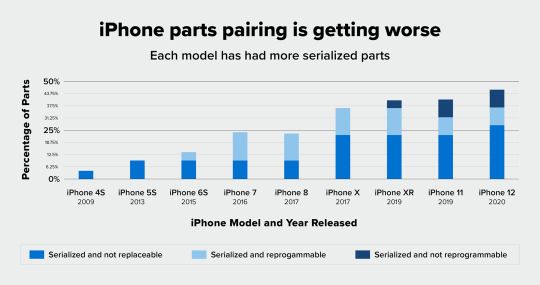
Every generation of Apple devices does more parts-pairing than the previous one, and the current models are so infested with paired parts as to be effectively unrepairable, except by Apple. It's so bad that iFixit has dropped its repairability score for the iPhone 14 from a 7 ("recommend") to a 4 (do not recommend):
https://www.ifixit.com/News/82493/we-are-retroactively-dropping-the-iphones-repairability-score-en
Parts-pairing is bullshit, and Apple are scum for using it, but they're hardly unique. Parts-pairing is at the core of the fuckery of inkjet printer companies, who use it to fence out third-party ink, so they can charge $9,600/gallon for ink that pennies to make:
https://www.eff.org/deeplinks/2020/11/ink-stained-wretches-battle-soul-digital-freedom-taking-place-inside-your-printer
Parts-pairing is also rampant in powered wheelchairs, a heavily monopolized sector whose predatory conduct is jaw-droppingly depraved:
https://uspirgedfund.org/reports/usp/stranded
But if turning phones into e-waste to eke out another billion-dollar stock buyback is indefensible, stranding people with disabilities for months at a time while they await repairs is so obviously wicked that the conscience recoils. That's why it was so great when Colorado passed the nation's first wheelchair right to repair bill last year:
https://www.eff.org/deeplinks/2022/06/when-drm-comes-your-wheelchair
California actually just passed two right to repair bills; the other one was SB-271, which mirrors Colorado's HB22-1031:
https://leginfo.legislature.ca.gov/faces/billNavClient.xhtml?bill_id=202320240SB271
This is big! It's momentum! It's a start!
But it can't be the end. When Bill Clinton signed DMCA 1201 into law 25 years ago, he loaded a gun and put it on the nation's mantlepiece and now it's Act III and we're all getting sprayed with bullets. Everything from ovens to insulin pumps, thermostats to lightbulbs, has used DMCA 1201 to limit repair, modification and improvement.
Congress needs to rid us of this scourge, to let us bring back all the benefits of interoperability. I explain how this all came to be – and what we should do about it – in my new Verso Books title, The Internet Con: How to Seize the Means of Computation.
https://www.versobooks.com/products/3035-the-internet-con


If you'd like an essay-formatted version of this post to read or share, here's a link to it on pluralistic.net, my surveillance-free, ad-free, tracker-free blog:
https://pluralistic.net/2023/09/22/vin-locking/#thought-differently

Image: Mitch Barrie (modified)
https://commons.wikimedia.org/wiki/File:Daytona_Skeleton_AR-15_completed_rifle_%2817551907724%29.jpg
CC BY-SA 2.0
https://creativecommons.org/licenses/by-sa/2.0/deed.en
--
kambanji (modified)
https://www.flickr.com/photos/kambanji/4135216486/
CC BY 2.0
https://creativecommons.org/licenses/by/2.0/
--
Rawpixel (modified)
https://www.rawpixel.com/image/12438797/png-white-background
#pluralistic#vin locking#apple#right to repair#california#ifixit#iphones#sb244#parts pairing#serialization#dmca 1201#felony contempt of business model#ewaste#repairwashing#fuckery
1K notes
·
View notes
Text
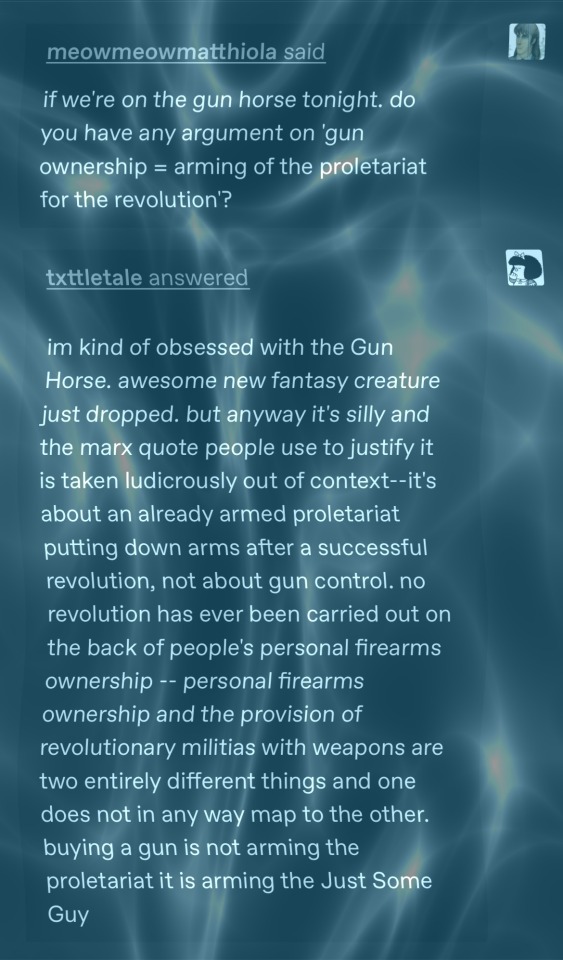
Gee I wonder how common private gun ownership was right before the Russian revolution? Oh wait it was actually common and civilians could easily buy firearms. Here’s a print ad from the time:
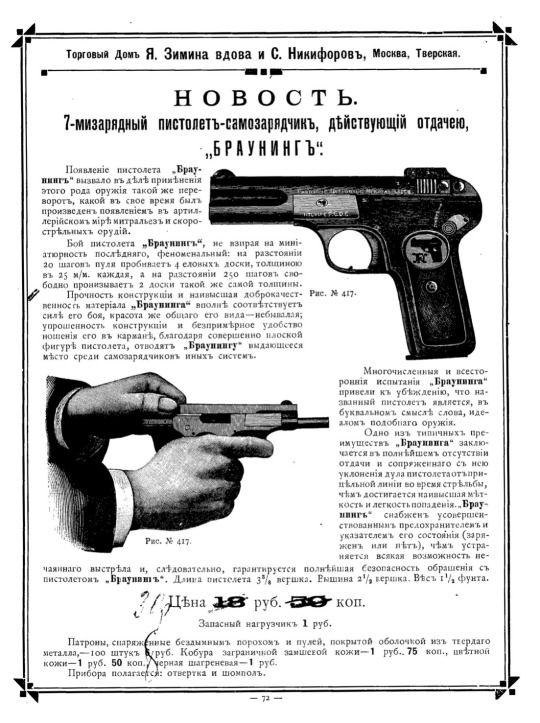
Historically, many revolutions and civil wars involved the use of privately owned firearms. A really common pattern that you see going back hundreds of years is that at the outbreak of conflicts, civilians would form militias, arm themselves with whatever they could get their hands on, storm government armories, and then steal everything not nailed down.
During the Yugoslav civil war, the UN enacted an arms embargo on all sides of the war from Sept 1991 through the end of the war. The VRS split off from the JNA, so they just took those weapons with them. However, the ARBiH had to acquire weapons from a lot of different sources, such as:
Stolen from JNA barracks
Stolen from Yugoslav police
Taken out of museums (Yes, really. They were literally using vintage captured MG42s from WWII)
Handmade (!) (Yes, really. I saw handmade guns that were used in the war on display in a museum in Sarajevo)
Smuggled in by Pakistani Intelligence Services (Specifically anti-tank missiles)
Picture: A group of ARBiH soldiers at the Old Bridge in Mostar, June 1992. The man on the far right is carrying a Winchester Model 70 (captured from a Serb, who purchased it in Montana)
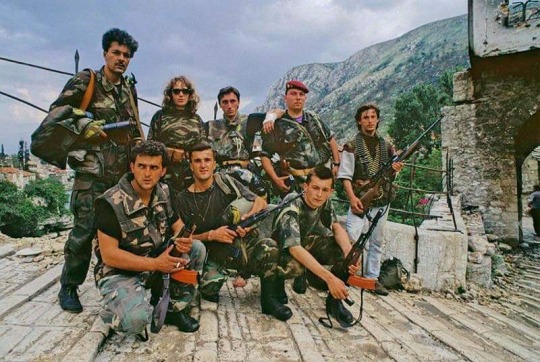
Picture: Two ARBiH soldiers, the one on the right is carrying an MG42.
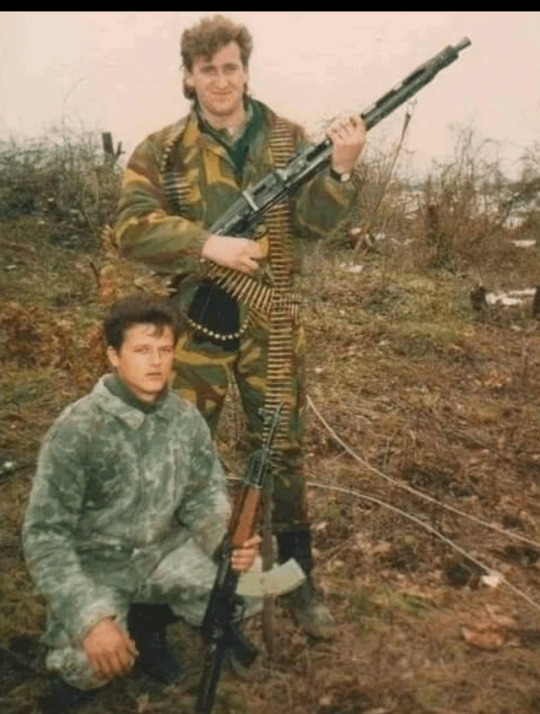
Another conflict (or, more accurately, long series of conflicts) that we can also look to is the American Indian Wars. Native American combatants used a variety of weapons, but the weapons that they prized most highly were contemporary repeating rifles. Famously, repeating rifles such as the Henry lever-action rifle were contributing factors to the victory of Lakota and Cheyenne forces at the Battle of Little Bighorn in 1876. (Native Americans had been purchasing guns for hunting and combat for over a hundred years at that point. One of the earliest accounts of such a purchase was in 1750 where French traders traded flintlock muskets for horses from Wichitas and Comanches.)
Picture: The Apache military leader Geronimo, on right, accompanied by three younger warriors, 1886.

Let’s take another, ongoing example: The Myanmar civil war (2021- present, as of April 2024).
Fighters in the coalition of anti-junta forces use a wide variety of small arms, but most relevant for this post is the manufacturing and use of the FGC-9, a 9mm carbine compatible with Glock magazines.
(Side note: FGC stands for Fuck Gun Control.)
The FGC-9 design uses a combination of 3D-printed parts and easily-manufactured pressure-bearing metal parts.
Picture: a People’s Defense Force soldier carrying an FGC-9.
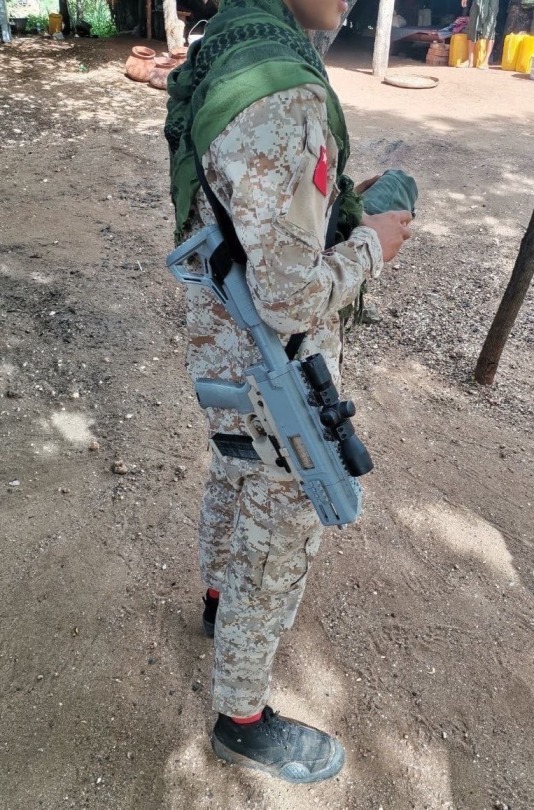
If you genuinely believe that there will be a revolution or civil war in your country in the future, then logically it is 100% reasonable to buy and train with guns right now.
If you genuinely believe that there will be a revolution or civil war in your country in the future, it makes absolutely no sense to hand-wave that away with “one day when the exact right circumstances emerge for a proletarian mass movement to Do Revolution, only then will we acquire even one single firearm. I’m just going to assume there won’t be massive obstacles such as arms embargoes, government crackdowns, or supply-chain issues that could completely stymie our ability to do that.”
If you genuinely believe that there will be a revolution or civil war in your country in the future wouldn’t it be better for the people on your side to already have some level of training & skill with firearms?
If you live in a country where the right wing has spent decades buying guns and salivating over the idea of starting a civil war and killing left-wingers and minorities, do you think it is a good idea to discourage left-wingers and minorities from buying guns?
178 notes
·
View notes
Text
Another thing that The Murderbot Diaries makes me think about is the concept of someone's birth being unethical in and of itself, and how to reconcile that with loving and supporting them. Wells touches on it briefly in Rogue Protocol in regards to GoodNightLander and their laws surrounding SecUnits, but while I wouldn't call it one of the main themes, it just kind of weighs uncomfortably in the air-
A SecUnit is made to cause pain, to feel pain, and to be disposed of when it is no longer more valuable than the sum of its parts. It is made sapient so it can feel every ounce of boredom and pain that it is put through. There is an extent to which the creation of a SecUnit is, in and of itself, an act of cruelty by its creator.
Where we're at right now, Murderbot seems to have a rather low view of other SecUnits. It knows what it wants, and it knows who it is, to an extent, but what does it think about a SecUnit's place in society in general? What does it think of in regards to a long term solution? Does it think one exists?
Then, also: Murderbot is an invaluable asset to anyone that it offers its allegiance to. But that then begs the question for Preservation, for PUoMaNT: How do you support, love, and care for a person who has been traumatized by having been brought into the world in the first place? How do you heal the wound that is the crime of your birth?
Then, taking it to its logical conclusion: How do you draft up laws and policies so as to support a person while not condoning the act of their creation? How do you make it clear to the person in question that they are worth of love and care, while also wrestling with whether they should ever have been brought into existence in the first place?
Preservation can make laws establishing constructs as autonomous individuals, but what next, and what will those laws do in regards to the rhetoric surrounding them?
How do you reconcile making space for someone's existence in a utopian society, without saying the thing that you are thinking, which is: In a perfect world, you would never have been created?
And maybe this is just me being deep in the paint in regards to allegory for disability here. As someone who has been in leftist spaces where the existence of disabled individuals in post-capitalist society is a problem that needs to be fixed, as someone who grew up autistic in an anti-vax household, as someone whose existence is often rather inconvenient for the folks planning their jobs in the metaphorical post-capitalist communal homesteads.
I mean, to be certain, I don't have literal guns in my arms, but I am genuinely interested as to how the post-capitalist societies in TMBD intend to handle people whose very existence is, through no fault of their own, antithetical to their values.
767 notes
·
View notes
Text
Assassination classroom got banned in some schools in Florida and Wisconsin.
On the basis that it could make "students think it's OK to kill their teachers", Jennifer Pippin, chair of the Indian River County chapter of Moms for Liberty, removed it from the schools library. Her group is actually outright stating that this manga is somehow correlated to school shootings, and therefore should be banned.
I'm horrified. First of all because if you spend more than two seconds actually *reading* the manga, the point isn't at all to endorse gun violence, but it's a severe critique to the educational system in Japan. But most importantly, from now on what else is gonna be banned in the name of safety? What about some of the most important classics in literature, will they also be banned because of violent themes that may inspire kids to misbehave?
This is exactly the kind of shit that you can find in anti logic, the belief that fiction affects reality to a 1:1 basis, which leads to the suppression of art and by proxy people's voices. It's not protection, it's not prevention, it's fascism. Censorship will never solve school shootings, it won't solve anything at all, but it will make you ignorant and it will take away your voice and your freedom.
Fuck Jennifer Pippin, fuck "Moms for liberty", and fuck any piece of shit that shares their bullshit ideology.
#anti censorship#pro fiction#pro fic#assassination classroom#assclass#ansatsu kyoushitsu#discourse#proship#pro ship#proship please interact#my post
755 notes
·
View notes
Text

Reflection (Kara reveals herself to Nia)
It felt like looking in a mirror.
When the frantic brunette stepped into the elevator, chattering distractedly at a mile a minute, Kara had to bite back a laugh. The nerves and the coffee and the horror of realizing that the new reporter had stepped into an elevator with the Kara Danvers brought some amusement to Kara. But Kara soon learned that there were other similarities - a passion for social justice, a reluctance to make waves - and Kara felt some kinship with her.
Nia’s average body temperature was 94F. Kara knew what it was like to hide.
Kara didn’t know that seeing her reflection would happen almost simultaneously with her own world falling apart. It wasn’t just the turmoil of anti-alien bigotry that felt like a kick in the gut. She was a stranger in Alex’s eyes - untrustworthy and suspect, drawing apprehension from the agent’s eyes whenever she wore the red and blue. Her strongest defender, the sister who protected her and stood by her… was gone.
The only other person she could be herself with - even if she did still have to hide - was busy with work. And when Lena wasn’t busy with work, she was busy with James. It killed Kara to watch them curl up together on the rare game night when Lena came by.
Nia’s hometown of Parthas was a breath of fresh air, but even that wouldn’t last long. In a town where naltorians and humans lived in harmony for ages - a town where Nia’s transness didn’t warrant commentary either - Kara found herself feeling hopeful. Until Liberty’s men came to destroy it, until she had to heatvision a gun out of her sister’s hand and received distrust in return.
The drive back home was a long one.
Her heart broke as Nia mourned the death of her mother, the destruction of her town, the you’re not even a real woman that her sister had thrown so callously in her direction. What seemed like simple similarities, like first-day jitters or an instinct for journalism, shifted to something stinging and sharp. Their stories weren’t the same - Nia had grown up in peace, Kara had grown up in turmoil - but they were both adrift in an unwelcoming world, without the people they cared about most to help them.
Kara pulled her car over.
It was Alex’s and Lena’s faces that flickered in her mind as she stepped out. The sister she had lost, the would-be lover that was in the arms of someone else, with no one left she could feel open with. She told herself - and Nia - that it was a logical decision to come out to Nia, because Nia wouldn’t be in danger, because she was a fledgling hero in need of mentorship.
As Kara turned and whipped off her glasses, as she temporarily took to the skies, she knew that this wasn’t entirely about logic. She was wrapped up in the wishes for her childhood, in the mourning of her present. If she couldn’t help herself, she could help someone who echoed her.
“I just need you to know now that you’re not alone,” she said when she landed. I just need to know that I’m not the only one.
#I think the degree to which Kara is wrecked by what happened with Alex is underexplored#and the degree to which Kara sees her younger self in Nia is also underexplored#there's a lot of pain there that occurred at the same time#S4 continues to be my favorite in terms of the writing#mel writes ficlets#supergirl#kara danvers#nia nal
107 notes
·
View notes
Text
Guys guys guys. Mentopolis is such a big story, such a big city, that several things can be happening all over the city and we would never know. And in fact, I think there are things happening all over the city that are central to the redemption arc of Elias Hodge that we just never hear about.
Because after Impluse grabs the packet, SOMEONE has to look at it, analyze it, think "Oh boy, this is a mind control gun! I better go talk to my boss about it", decide to bring a grappling gun, GET a grappling gun, (presumably) have a whole conversation with Elias's boss after which he gets shot with the mind control gun, and decide to JUMP OUT THE WINDOW, all without the rest of the mind really knowing about it.
Even before that, someone in the mind got Elias to take copper supplements—as a habit. Thats not a one-off decision, but a choice that requires several steps to carry out, multiple times. The conscious mind knew about mind control.
These are not impulses, instincts, or running on autopilot. These are conscious, intentional decisions. Major Logic seemed to have no idea what was going on (I'm guessing Ambition had blocked his access to information somehow) but some people in the conscious mind had to know. They were receiving sensory inputs until Elias jumped out the window and hit his head.
I don't think it was one person who was doing all of these things. I think they would have been important enough that the players would have run into them. No, I propose an anti-mind-control conspiracy made up of several lower-level government workers that worked to help Elias overcome the mind control. Conspiracy may be too big of a word, but we know that people other than the PCs were working to get Elias to survive. Individually or together, several people got Elias to take copper supplicants, grab the grappling gun, and jump out the window, totally unconnected to the PCs. I propose that Norrel and H. V. Lance were both part of this group. That was how Norrel knew about the copper supplicants that he used in his gun, and he knew mind control was a concern way before the rest of the mind.
But that leads me to another point. When Elias was falling from the building, he seemed to forget he had a grappling gun. If the PCs had not interfered, he would have just fallen to his death. The concepts that got him to jump out the window with a grappling gun were somehow unable to get him to use it. So let me ask you this:
What was Madam Loathing doing in Ambition's office when The Fix came to visit?
Ambition was meeting with some other businessmen, so likely the answer is that Loathing had just, or was about to, take them over. But she was already hiding in the room when the Fix entered. This is the time frame between when Elias jumped out of the window and before he used the gun, a time when we know Loathing was at city hall. I think she found and killed/took over the people who helped Elias.
The PCs were not the only people looking out for the big guy. Mentopolis is just so big that they never knew about the people who died to give them a chance to fight back.
#d20#dimension 20#d20 mentopolis#mentopolis#elias hodge#the fix#mentopolis spoilers#dimension 20 mentopolis
138 notes
·
View notes
Text
I'm kinda sick of the Liberal obsession with trying to "gotcha" reactionaries with their apparent hypocrisies and ideological inconsistencies. The fact of the matter is that their ideology is very consistent and they usually behave well in accordance of it; the preservation or strengthening of Western Imperialist Capitalism and all it's attendant forms of oppression and exploitation (i.e. Patriarchy, White Supremacy, Homophobia etc.). They do this primarily out of their own self interest; even those who don't occupy a position near the top and have no illusions that this well ever change do derive a range of privileges from the existing hierarchies, especially from helping to actively enforce them. Many poor or otherwise marginalised reactionaries may very well be better off in the long run should these systems be abolished, but in the short term the benefits of collaboration are too large to simply be written off.
They employ a wide range of rhetoric to these ends. While much of it is actively contradictory this doesn't matter as the actual words themselves are unimportant; what's important is the values they convey. Likewise the actions they perform may not align with the rhetoric they speak but, as long as this does not conflict with their goal of self serving enrichment through loyal service to the existing order, you can hardly call it hypocrisy in the a meaningful sense. A US conservative proclaiming that he'll violently resist arms control one second before loudly professing is love of law enforcement the next isn't being inconsistent; both state and vigilante violence are important arms of the Capitalist White Supremacist order. There's a reason all these anti-gun control types turn a blind eye when it's non-white people being disarmed (just think of the Black Panthers in California). And a homophobic politician who secretly employs the services of gay prostitutes isn't a hypocrite in any consequential way; homophobia is a convenient tool for both short term political ends (marshaling votes and providing a convenient scapegoat) and longer term social ones (maintaining the absolute dominance of the heterosexual nuclear family for the purposes of labour reproduction, control and exploitation) and by keeping his activities as a shameful secret you can hardly say that he's advancing the cause of gay liberation. Your attempts to own reactionaries with facts and logic are meaningless when you refuse to recognise the logic they actually operate on
47 notes
·
View notes
Text
So many of our loved ones have left us recently. I speak, of course, of restaurants. Times are tough for the food-providing industry, between landlords turning the screws on innocent business owners, workers asking for a liveable wage, the price of wilted iceberg lettuce, and the incessant hum that directs, nay, commands them to sleepwalk in the middle of the night towards the howling void that lives at the centre of town. With all this in mind, it should be no surprise that our favourite greasy spoons are at risk of closure.
Everyone agrees that the real victim in all this is me. Restaurants that are closed sit useless and empty, unable to be converted into garages because of bigoted anti-shitbox municipal building code. I can't even park in front of them for a long period of time, because the city fathers decided to put parking meters in front of them back when they were popular restaurants. No matter how you look at this, there is simply no way I can benefit from the current state of affairs, which is the biggest tragedy of all.
There is one hole in their logic, though. Food trucks. Because of a little mix-up in the city's health code – a teeny-tiny boo-boo – food trucks can be run as long as you have the rights to a former restaurant. And, despite the name, there is actually no legal requirement as to what kind of vehicle a food "truck" is. See where I'm going with this? I hope you do, because otherwise it's going to be very awkward when a smoking 1978 Volare is parked outside your house, pouring boiling 75W90 engine oil into the gutter from its near-shattered slant six. It will still have a net benefit, thanks to the fact that I've ratchet-strapped an old Frito-Lay snack vending machine to the backside. Try the Fritos, or the Lays, and either way you can't deny that it's a motor vehicle you can buy food from.
All this is really a roundabout way to say that I've bought the rights to several dozen bankrupt restaurants, cafes, eateries, and saloons dotted about the tri-state area. To tow me – to dare to oppose my might – is to challenge the primacy of small-business food service the world over. It's gonna bring some heat. And let me tell you, if you think you have a problem now, with some weirdo dispensing potato chips into your neighbourhood? Wait until Ikea shows up with one of a fleet of specially-modified Volvo 240s, machine-gunning free samples of Swedish meatballs into anything that stands still long enough to show up in the sights.
134 notes
·
View notes
Text
I’m only on episode 3 of the fallout tv show, but so far none of the inconsistencies from the games that people have bitched about have made sense to be bitched about.
Spoilers obvi.
Why is Cooper/The Ghoul ‘impossible to kill’? Bro uses V.A.T.S. in combat to get his shots. Plus Lucy at this point in time uses a tranq gun and Maximus is a terrible shot. Cooper’s got 290+ years on them! He’s figured out the game!
The hand jets? Did y’all forget The Brotherhood of Steel ALSO invents shit? They don’t just hoard technology they believe is dangerous? Again. It’s been 290+ years since the bombs dropped. After trial and error, they most likely found a way to mod the T-60s to allow hand jets OR jet packs if wanted. Plus Knight Titus, the asshole he was was definitely the type of asshole to think he’s cool enough for hand jets.
Dogmeat being a girl? Get the fuck over yourselves. She’s a fucking dog. Also do you know why most trained stunt dogs are female? It’s because no one wants to look at dog dick in 4K if they’re hired! Plus something about female dogs being easier to train due to their temperaments.
‘But- but the Enclave was destroyed-‘ they were mostly destroyed! The remnants that survived what happened in Fallout 3 -get this- scattered. Some went to the Mojave which we found out in New Vegas which later found their way to the NCR which we jump to in the tv show, some were found in the Commonwealth thanks to DLC for Fallout 4. They weren’t where they were during the events of Fallout 3. Far from it! But because of Dr Wilzig, we got Dogmeat and she’s the goodest girl.
I get some people are newer to the fandom, but also a LOT complaints are coming from older fans who -not gonna lie- forget that Fallout as a series has some wacky shit going on. You have Mysterious eldritch human-like entities with godly weapons who can greatly damage and kill your enemies in one to two shots or bestow misfortune upon who they shoot or help you if you’re downed.
You’ve got a cult who worships atoms because they believe we’re all just different universes waiting to be renewed by a nuke going off. At the same time there’s a cult that worships the 4 horseman of the apocalypse and believe they called each of the 4 groups to bring each of the signs with them (war, famine, pestilence, death).
You get to meat a plethora of companions on the games from humans to animals, super mutants and ghouls to robots! Hell, in the first game you had a hyper intelligent deathclaw as a companion only because when the Enclave made them the group of deathclaws decided they didn’t want to kill humans and instead wanted to befriend and trade with them within the vault they were shoved into after the Enclave slaughtered basically the entire vault.
In Fallout New Vegas in the Big Mountain DLC you can fucking flirt with your own brain if you choose to do so (they will be appalled by your actions to do so).
Yes, the game is anti-war and about how governments are corrupt and War never changes, but there’s so much goofy ass shit in the games and lore that you need to allow yourself to have a bit of fun and use some game logic when dealing with the tv show or you’re just gonna be fucking bitter about everything you find inconsistent with the games. (Remember, they still have yet to tell us HOW exactly a ghoul is created and keep changing HOW they’re created. It’s never been consistent throughout the games)
24 notes
·
View notes
Text
Why I didn't like the ending of R&R. Part 4. Let's talk about pairings
I'm back! Let's continue the analysis, this is the penultimate part.
Another problem of the finale is that Nikolina storyline, speaking in Russian, is Bondarchuk’s gun (that is, it leads to nowhere and it is generally unclear why it appeared).
In the story, Alina has three love interests - Mal - a childhood friend and first love, Nikolai - a charismatic prince who decided to take the throne through cunning through a political alliance with Alina as a Saint, and Darkling - an immortal Grisha and the only equal to the heroine in strength (in theory, in practice it is much stronger), with whom Alina has an unbreakable connection. It's logical to assume that all three ships will play a role. But in reality, Nikolai acts as a third wheel, because the main confrontation is between the Darkling and Mal.
Mal symbolizes Alina's past - life as a otkazat'sya, and Darkling present - life as an immortal and powerful Grisha. It is logical to assume that Nikolai represents the future - life as a Saint and Tsaritsa. Logical, but apparently not for Leigh Bardugo. In her story, Mal is the past and the present and the future and everything in general. There is no one else for Alina and there cannot be anyone else, otherwise she is a slut (this is not my opinion, if anything). And that's the problem.
Yes, I didn't like the fact that Malina became the endgame. And no, contrary to popular belief the anti is not at all because my shipp (Darklina) is not the endgame (although I perfectly understand those who are unhappy about this, because it was Darklina who lured us into the plot, this is a fact, and this can be easily proven) . No, I would be quite happy with Nikolina. I didn't expect Darklina endgame after the Darkling burned down the orphanage and killed Ana Kuya and the instructors (which, in my opinion, was his most disgusting act in the trilogy) and promised to break Alina (which would have break him too, IMHO).
The main (but far from the only) reason why I (like, I assume, many others) cannot accept Malina endgame is that the author broke the entire plot for her sake. Think for yourself, because of Malina all the fuss happened with the third amplifier, because of Malina Alina in the end lost her powers, ceased to be a Grisha and was able to calmly go into the sunset and not have consequences for her rash actions, because the problems are Grisha and Ravka no longer concerns her, because she is now just an ordinary otkazat'sya, because of Malina Mal was ✨magically resurrected✨ and because of Malina Alina rejected Nikolai.
Why was it even necessary to introduce a love line between Alina and Nikolai, if in the end it did not lead to anything? Unclear.
If I were the author, I would rewrite the entire plot, because I wrote some kind of nonsense *khm* What am I talking about? Oh yes, I would have left Alina her powers, let her destroy the Fold herself, left Mal dead and ended the plot with Nikolina, even despite my great love for Darklina. Not a perfect ending, but at least a satisfying one. A favorite pairing is good, but you need to think sensibly and not ruin the entire plot for it.
Here is another meme for you, see you in the final part🤗

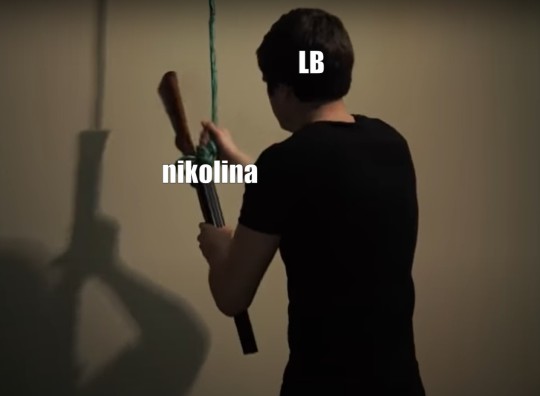
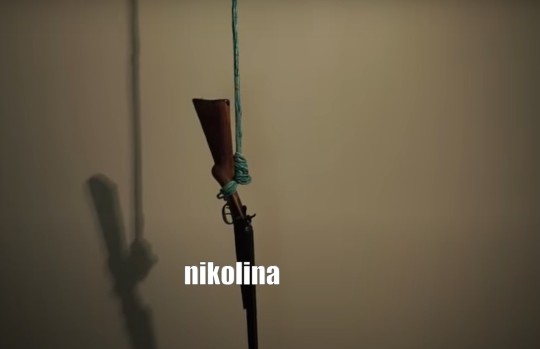
#grishaverse#shadow and bone#ruin and rising#anti leigh bardugo#the darkling#alina starkov#malyen oretsev#nikolai lantsov#darklina#nikolina#anti malina#anti mal oretsev
24 notes
·
View notes
Note
Re this ask, 722433031603879936 , specifically the part from below:
It literally makes no sense to me how people who will claim that "consuming disturbing/triggering erotic fiction is self harm!" Will almost never apply that logic to horror fiction (especially movies)
This isn't really what you were talking about, I know, but the ask made me think of it and got me on a mental tangent. I very much agree in broad strokes with this anon and the reply--this isn't any form of attack or disagreement, but an add on, and a slightly different, but related, comment.
I actually have used my consumption of media as a form of self harm, and know others who have likewise done with same. I never really did so with horror or erotica personally, but would seek on content I knew I found to be triggering (though at the time, I didn't know it was a trigger and hadn't even heard the term beyond 'trigger on a gun' and had no clue this was a form of self harm) and read it until I was, well, triggered. I can go on about why I did this (12-16 year old me wanted control, and reading the triggering content in fandom somehow did that, even if not in a healthy way) and how it was actually hard to stop, but wow did I ever seek it out. I looked for content with child sexual abuse, looked for characters who self harmed themselves, and looked for other content along those themes. I never really liked erotica, but did find the odd extreme underage smut and read it, but usually clicked out due to boredom. A lot of what I sought out and read in those years did hurt me, in a way. I dabbled in writing some as well. However, I always saw it as fiction and escapism, even when, in retrospect, I was actually hurting myself and using it as a weird form of self harm.
I do know this is different than anti's seeking out content (and not exactly what anon above meant, I think), and it VERY much had nothing to do with the media. At all. It was always on me for clicking on the links, which is where I think I, and those I've talked to who also have done this, differ from anti's. Even as that pretty messed up 12 year old I knew I was seeking this out, and I knew I was the one reading it. I didn't have the language for how it affected me, or why I looked for it so often even though it left me Not In A Good Place, but I did. And you know? It was still healthier than some other things I could have done, and was tempted to do. But wow my therapist has had fun with all this, poor woman.
Basically, there are definitly people who use media as a form of self harm. I never personally went to erotica for that, but knew people with similar experiences who absolutely did, and while I don't know anyone who used horror, I would assume at least a few exist. I still read and write some of that content, but in a much healthier way at 32 than I did as a teen. AO3 has been a godsend for that to be honest. I started on ff.net and it was always a bit of a trial to find (or not find) what I wanted.
Anti's are just jerks about it. I needed therapy and help as a teenager, but likewise was able to understand I was the one seeking out things that fucked with me, and that the authors had no blame. Hell, I commented a lot (generic -- loved this!!). It was never on them. I've reread some of those fics as a much better adjusted adult, and still appreciate them, even if in retrospect, they weren't the best fics lol.
A part of me can understand, or even pity, some of the anti's who seem to look for erotica they know makes them uncomfortable or worse. But overall I just think they need to sit down and shut up, and look inwards. There are a lot of complexities to the anti mindset sometimes. I'm sure some are fucked up kids who are trying to get control wherever they can and fell into an anti group, and will hopefully eventually grow the hell up. But too many anti's have chosen to be terrible to others, and for that? My understanding and pity runs out very quickly. I've been there, in a very different way, and even then knew better than to blame someone else for something that was hurting me, especially when I was the one looking for it.
This got long and rather rambly, but the ask brought it to mind!
--
Yeah, I think many of them are self-harming in a similar way. They're just in denial about who's holding the reins.
70 notes
·
View notes
Text
Last weekend, U.S. Secretary of State Antony Blinken visited Israel, Jordan (to meet with Arab foreign ministers), Ramallah (located in the West Bank), Iraq, and Turkey. With the war between Israel and Hamas now entering its sixth week, U.S. diplomacy has kicked into high gear. As Blinken works to secure humanitarian relief for Gazans caught in the crossfire, he has been signaling where he and the White House would like things to go once the fighting stops: a “revitalized” Palestinian Authority (PA) that would administer the West Bank and Gaza and a temporary international force to help provide security in the latter.
These ideas are probably the only ones that satisfy U.S. political, diplomatic, and geo-strategic concerns as well as those of some Arab governments. Yet they are likely to fail.
The Biden administration is embarking on a path that it studiously avoided during its first three years—and for good reason. It is now going to discover that, despite its efforts, when the war between Israel and Hamas ends, the region will look more like a version of the status quo that existed on Oct. 6 than a new Middle East.
As Blinken crisscrossed the Middle East, he seemed of the mind that this war is a paradigm-shifting event. This is a misplaced hope, however. No doubt there is a place for U.S. diplomacy in the conflict, but the secretary of state is approaching it with a set of assumptions—about the likely effects of the war on Israeli and Palestinian politics, the interests of regional actors, and Washington’s influence—that are defective.
It is not a bad assumption that Prime Minister Benjamin Netanyahu’s days are numbered. He presided over the single greatest security failure in Israel’s history, which undermined the entire logic of his long tenure as the country’s leader. Netanyahu told Israelis that he was uniquely capable of providing them with the security and normalcy that they so desperately craved. It would be an extraordinary demonstration of political skills for him to survive this crisis.
But his likely political demise does not portend the resurrection of the Israeli peace camp. Even before Hamas murdered around 1,400 Israelis on Oct. 7, the standard-bearers of the two-state solution had become marginal political actors. Israel’s left-wing Meretz party, which commanded as many as 12 (out of 120) seats in the Knesset in the mid-1990s and most recently was a member of Naftali Bennett’s anti-Netanyahu government coalition in 2021, failed to win a single mandate in the Israeli parliament in the November 2022 elections—a loss of six seats. The Labor Party—the party of Israel’s founders and builders—sits in the Knesset with a mere four seats.
Elections will not happen until after hostilities in Gaza come to an end. But it seems likely that after Hamas wrought so much death and destruction on Israel, Israelis will again rebuff those peddling a peaceful coexistence with Palestinians. A postwar government could very well end up being a Netanyahu-less center-right-right coalition.
During the second week of the war, polls showed that Benny Gantz—the former defense minister and leader of National Unity alliance—enjoyed broad political support. He is a centrist only by Israeli standards, however; he ran to Netanyahu’s right on Gaza in previous election cycles and remains coy about Palestinian statehood. All of this suggests that if Blinken and his advisors believe they can resurrect the two-state solution, then they misapprehend Israeli politics.
Central to the U.S. day-after approach is the rehabilitation of the Palestinian Authority for it to take responsibility for the Gaza Strip once again. It is not at all clear what the goal of revitalizing the PA means in practice, though. Pouring money and guns into PA President Mahmoud Abbas’s coffers has helped him build a corrupt national security state.
Perhaps Blinken intends for there to be new elections in the Palestinian territories. Yet Abbas could lose, which is why the PA has not held parliamentary elections since 2006, when his faction—Fatah—lost to Hamas.
Even if Abbas could overcome the PA’s corruption, dysfunction, and lack of legitimacy with U.S. help, it is unlikely that he would want to be the U.S.-Israeli proconsul in Gaza. After all, that is at the heart of Hamas’s critique of the Palestinian Authority: that it advances Israeli—and by extension U.S.—interests at the expense of Palestinian rights. On this, the Hamas leadership is not wrong.
Presumably, the United States will enlist the so-called international community to help the Palestinian Authority get on its feet. This is not a bad thought, but Washington needs willing partners—and no leader in Europe, Asia, the Middle East, Latin America, or Africa has raised their hand to help with either providing security in Gaza after the war or helping to reenergize the PA. It is almost certain that there will be a conference in Geneva or Istanbul, where countries will pledge billions of dollars for the reconstruction of Gaza—most of which will never arrive.
But don’t expect foreign troops to materialize to keep peace. The Europeans will resist out of fear, the Egyptians will balk because they do not want to be responsible for Gaza, and the rest of the Arab world lacks the capacity for such an important mission. One can imagine that Turkish President Recep Tayyip Erdogan might dramatically offer Turkish troops, claiming historic responsibility and Muslim solidarity, but the Israelis will never agree to Erdogan’s aggrandizement at their expense.
Let’s play a thought experiment: Suspend reality and suppose that the United States can renovate the PA, European and Arab countries step up with peacekeeping forces for Gaza, and the Israelis produce a moderate centrist coalition. This would be good news, but the bases of the conflict between Israelis and Palestinians would remain. Israelis will still not want to share Jerusalem, they won’t accept Palestinian refugees in their midst, and they will not agree to live within the boundaries set on June 4, 1967, at the end of that year’s Arab-Israeli War. For their part, the Palestinians will not give up a capital in Jerusalem, cannot forsake the refugee issue, and must have a territorially contiguous and fully sovereign state.
There is nothing about the war in Gaza that will encourage Israelis and Palestinians to alter these positions. The world always expects the two parties to walk right up to the abyss and pull back, but instead they always join hands and jump.
The appetite for destruction that has played out in Israel and Gaza over the past month reflects the fact that the underlying conflict between Israel and the Palestinians is not yet ripe for resolution. And there is little reason to believe that when the current round of fighting is over, the situation will be any more propitious for diplomacy. Hamas needs to not lose, and even if it does, it will have burnished its resistance credentials to the extent that the cost of the conflict will be worth it for the group’s leaders.
The Israelis are bloodied, but not enough for them to seek a different path. This is especially true as long as the Lebanon-based militant group Hezbollah sits on the sidelines and takes shots at Israel without triggering a full-scale war.
In addition, Israel’s relations with Arab states remain mostly intact. The Jordanians have recalled their ambassador and told the Israelis not to send one back to Amman until after the fighting has stopped, but King Abdallah has not severed relations. The lower house of the Bahraini parliament issued a statement suspending relations that did not actually suspend relations. The head of the foreign affairs and defense committee of the United Arab Emirates’ Federal National Council said: “From the United Arab Emirates perspective, the Abraham Accords are there to stay.” Saudi Arabian Minister of Defense Khalid bin Salman, who also happens to be the crown prince’s brother, reportedly indicated in Washington last week that the kingdom remains interested in normalization with Israel.
Breaking ties or putting potential ties on ice might get Israel’s attention, but Arab leaders don’t seem willing to take that step.
Taken together, all of this suggests that after all the death and destruction, and all of Blinken’s shuttling, the Israeli-Palestinian conflict will end up no closer—or, more likely, even farther away—from a settlement than before Oct. 7. The only difference will be whatever security regime Israel devises for the Gaza Strip—a territory that Hamas cannot be allowed to continue governing, but which no international power is willing to take responsibility of.
It is true that the Israel-Hamas war seems cataclysmic, but it is not a paradigm-shifting event like Egyptian-Israeli peace, the end of the Cold War, or the terrorist attacks of Sept. 11, 2001. It is a local conflict—the stakes of which have been magnified many times because of passionate partisans on both sides, far away from the bloodshed.
It will remain as it was before: unresolvable, no matter how much mileage Blinken clocks between Washington and Middle Eastern capitals.
44 notes
·
View notes
Note
so funny thing with your dont look back thing, nearly all the political allies of Leia and folks, generally like VERY few that we know are actually directly democratic. like Padme former job could count sorta, but how democratic MONARCHY would work.... although Darsana could be a mostly democratic on via his Senatorship. found it funny cause Bail is like assigned by the queen and padme is hers as well, which fair, Senator is a really bad term for what they are, diplomat would be the better term.
I mean, I've thought a lot about how the Senate is ostensibly a democratic body when actually there is no planetary regulation to how they "elect" their senators.
I've ultimately decided to not go down this specific route for the fic, but arguably, the Republic is...not a government. They don't have anyone to enforce their "laws." The GFFA is huge. Like, I cannot stress this enough, taking the loose shapes of government for countries and slapping it down as a framework for how tens of thousands of planets are "ruled" by a "democracy" was always, at its core, bullshit. The Empire, with it's huge military and aggressive enforcement couldn't prevent the Alliance from camping out on abandoned planets, which, we know as residents of this good earth, is more than enough space to develop multiple entire civilizations. Frankly, as horrifying as it was, the Death Star was about the only logical conclusion space fascists could come to for a total control endgame.
(That or implanting chips like the clones had but whoops, the past won't exist until 15 years after the future, so...)
That isn't to say that the Republic, or something like it, wouldn't exist and serve a purpose. Having a forum where people in disparate governments agree to things like trade rules and enforce them by, say, refusing to trade with people not in the group, or at worse rates, could definitely explain a Republic sized coalition of planets/planetary systems. They could even develop things like anti-slavery agreements, taxes dues, a group of negotiators loyal to the "Republic" instead of to individual planets or systems for theoretically unbiased diplomacy.
But yeah, if you notice that Leia's views on democracy don't match Padmé's assertions from AotC and RotS(released post 9/11 guys, Anakin's character was not the only casualty of that time), it is 100% because she was going to be the hereditary ruler of a planet and had no problem with that.
Keep in mind that democracy, in many ways, is more effective the more direct it is, because even self-interested politicians have to give you what you as a majority want if they have to win each of your individual votes. But that is incredibly hard to organize and maintain. Especially because the elected officials figure out really quickly they don't want to be beholden to so many contradictory interests.
And the more indirect a democracy becomes, the more your welfare relies on the innate charity/sense of responsibility of your representatives. Yes, as people who weren't voted into office, Padmé and Bail don't actually answer directly to their people. Padmé's on a bit thinner of ice because she's appointed by a directly elected queen, so Jamillia has motive to oust Padmé if she threatens Jamillia's re-election.
But Bail? Our favorite, made it through most of the Empire, stuck to his guns, initiated the Rebellion, raised his baby girl right? Yeah, no, he's a nepotism boy, and everyone would have been screwed if he didn't have the moral and ethical fortitude of mountains.
#Don't Look Back#politics#Padmé Amidala#Bail Organa#democracy#this isn't just true for DLB#the structure of the Senate 100% allowed for the kind of corruption that enabled Palpatine's takeover#he didn't need to convince the galaxy to make him Emperor#just a bunch of scared senators who didn't want to lose their jobs#and were happy to war monger because the Confederacy was very dangerous competition#in theory#if they hadn't also been controlled by the Sith
291 notes
·
View notes
Text
wake up, wormblr, it's time for your irregularly scheduled schizopost:
so in an earlier post i discussed the ways in which worm resembles literature of the first world war--its style of violence, its psychoanalytic tropes--but i believe now that that was inaccurate. where i recognized one of worm's defining characteristics (its lack of ideology) i failed to put it in the appropriate theoretical framework. i now understand it is End-of-History Fiction.
i reached this insight while reading about the contemporary mexican civil war: i believe that, just james cameron's Avatar is essentially gillo pontecorvo's The Battle of Algiers repackaged to be sold to an american population incurably brainpoisoned by a century of insidious hollywood plot-structuring, worm is essentially an attempt to repackage the battle between the mexican government and the los zetas drug cartel for a generation of hpmor readers. at the center of worm is, for all intents and purposes, a non-ideological civil war between the commonwealth of massachusetts (although political borders are not a useful concept here, as we shall discuss later) and a whole concatenation of gangs, namely the one of which the undersiders are but one part. but these are not gangs--as in the case of los zetas--that run according to the antiquated patriarchal model as exemplified by the italian mafia; instead, they are entirely sans ideology.
they are, as opposed to the familially or religiously or politically bound criminal/terrorist actors of the twentieth century, essentially an-narco-capitalist in nature. they have no goal but the bottom line. their mode of governing is a return to what foucault would call the society of sovereignty, which defined the feudal era. as reporter seth harp says of the so-called drug war in mexico: "it isn't that the governors are corrupt so much as they are of the cartel." but crucially, this is backed by conspiracies of technocapitalists (cauldron in worm; the united states in the case of mexico). the global circulation of drugs, guns, and money requires a speed only attained through the porousness of borders made possible by neoliberal policies such as NAFTA. both wars are not feudal but neo-feudal.
in his book Specters of Marx, jacques derrida describes the fundamentally christian eschato-teleology of hegel's conception of history, which francis fukuyama adapts and updates for the post-cold war world. this is the method by which worm reconciles its cynical post- or anti-ideology with its messianic content (in the form of taylor, who is far more christlike than moses-like, defined by the sublimated violence engendered by the "turning of the cheek"). post-coil brockton bay is the concretization of the ultimate logic of neoliberal capitalism as anticipated by fukuyama. (remember, hegel did not believe that the victory of the liberal state would end conflict forever; he believed conflict was eternal.)
just as in mexico, brockton bay exemplifies what derrida would call the hauntology of liberal democracy. there is a promise of democracy, an injunction to democracy, but there is no democracy. these words defined the twentieth century, and in the twenty-first, where they have nominally "won," they are not to be found. there is only the farce of khepri.
#wormblr#worm web serial#henghost's schizoposts#thoughts you have on edibles#worm is the 2666 of web fiction
101 notes
·
View notes
Text
Man, Dros is such a tragedy.
He was 16 when Operation Death Blow landed. He was a half-trained kid put in charge of full adult soldiers and teens like himself, told to be the voice of the Commune to the Military as the entire force of the world bore down to destroy them. It's a super fucked up situation that no one could ever be prepared for, let alone a sixteen-year-old. No sane person could expect him to rise to that challenge. Even in the best of times, I would not entrust a teen with being a commissar. But it was the turning point of the war and the communards were desperate, so here's this idealistic kid who just wanted to do his best to serve the cause and his city.
When the bombs started to fall, he got scared and ran away. Running away from horrible imminent death is a perfectly normal response for a human being! But he wasn't supposed to be just "a human being." He was supposed to be a Soldier and a Commissar and a Leader. Instead, he was the Deserter.
In his extreme survivor's guilt afterwards, he never rejoined any of his fellow communists. Why not? Sure he was ashamed of his cowardice and feared punishment for deserting his post. But it's not like if he'd stayed at the Sea Fortress, he would have made any difference in the outcome. His inframaterialist superpowers weren't going to un-jam the anti-aircraft gun. If he'd met up with any other communists, given their desperation, they would have forgiven his desertion and allowed him to join their unit. Maybe if they had won the war he could have gotten his court martial later. But of course, survivor's guilt brain wouldn't let him imagine forgiveness. He must be Tormented and Punished for his Crime. Moreover, he feared what the world was doing to the communists: rounding them all up for execution. Again, pretty reasonable thing to be afraid of!
If you're a communist choosing to forsake your entire community because you fear the consequences, is communism really your highest ideal? The logical resolution to Dros' cognitive dissonance would be to say, "My actions don't match what I claim to be my ideals. Therefore, communism isn't actually my highest ideal, something else (self-preservation) is." Instead, Dros convinced himself that "living to fight another day" really was the best thing he could do for communism. This approach made some sense for a time. Less so once every other communist was dead.
But it was a useful rationalization for a guilt-wracked idealist. It soothed his fear of exposing his past failure and his fear of dying. It let him think he only put his life before communism that one time and never again. It let him convince himself that he was ideologically pure and ignore how meaningless that claim is when he never let his ideals come into contact with actual society for 40 years. Being in self-imposed exile, no one could ever tell him otherwise. He would always be Right and always be Atoning.
His tragedy isn't that he deserted all those years ago, it's that he never let himself be Seen after it. The only thing that would have let him move past his guilt was the forgiveness of others, which he denied himself through his isolation. So instead, his failure and inability to move passed it became his identity.
This guy. What a frightened mess twisted with guilt and trauma. What an absolute withered wreck of a human being.
#disco elysium#disco elysium meta#disco elysium spoilers#disco elucidations#iosef lilianovich dros#the deserter
335 notes
·
View notes
